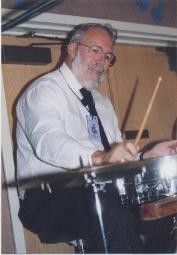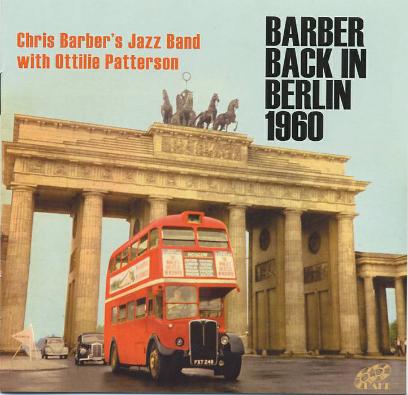CD Review
Bert Thompson
Disc One Playing time 59m. 00s. 1) Bourbon
Street Parade; 2) Georgia Cakewalk; 3) Papa De Da Da; 4) Soudan; 5) What’s I’m
Gotcha; 6) Lord, Lord, Lord; 7) Sweet Georgia Brown; 8) There’ll Be a Hot Time in the
Old Town Tonight; 9) It’s All Over; 10) Heavenly Sunshine.
Disc Two Playing time 56m. 32s.
1) Hiawatha Rag; 2) Majorca; 3) Do Right Baby; 4) New Orleans Hula; 5) Hushabye; 6)
Wild Cat Blues *; 7) Take Your Pick; 8) Whistling Rufus; 9) I Can’t Give You Anything
but Love; 10) Come along Home to Me; 11) When the Saints Go Marching In.
*This track is misnamed in the tray insert and in the booklet. There it is listed as St.
Philip Street Breakdown by George Lewis but is actually Sidney Bechet’s composition
Wild Cat Blues.
Recorded Deutschlandhalle, Berlin, May 4, 1960.
Personnel: Chris Barber – Trombone, double bass (track 2-7), vocal (tracks 1-1, 6); Pat
Halcox – Trumpet, vocal (tracks 1-1, 6; 2-3); Monty Sunshine – Clarinet, vocal (tracks 1-
1, 6); Eddie Smith – Banjo; Dick Smith – Double Bass; Graham Burbidge – Drums
Ottilie Patterson – vocals (tracks 1-8, 9, 10; 2-9, 10, 11)
In the heady days of the very early fifties in the U.K., traditional jazz was beginning to
blossom and to sideline much of the pop music of the time—deathless paeans to
doggies in the window, monkey honeymoons, and crying little white clouds.
Following the emergence of the George Webb Dixielanders and the Crane River Jazz
Band came the band formed by Chris Barber and Monty Sunshine in 1953 about the
time Ken Colyer returned from New Orleans to a hero’s welcome in the trad jazz
ranks. Pat Halcox declining the trumpet chair, it was offered to Colyer, and the band
was originally called Ken Colyer’s Jazzmen. With Colyer’s departure a little over a year
later, Barber took over as leader, Pat Halcox agreed to replace Colyer, and the group
became known as the Chris Barber Jazz Band. It then went on to become arguably the
most popular trad band in the U.K., and even with several replacements in the rhythm
section, the band’s status did not change as their sound remained fairly constant, the
front line still being the “original” and Ottilie Patterson still singing with them.
Barber and his men, while embracing the New Orleans style of emphasis on ensemble,
differentiated themselves from others by “polishing” the ensemble sound (most
improvising being left to the soloists), working out head charts and then executing
them cleanly. Halcox’s trumpet lead was not a forceful one and Barber played a very
“light,” punchy trombone—no long slurs and growling glissandi—and on clarinet
Sunshine danced around the other two in the front line. The result was a bouncing,
light rhythm that the back line complemented, the whole effect finding much favor
with the fans. That sound is what we have here. The Berlin concert of 1960 contains
both numbers that are often to be found in the Barber play lists, but others that seldom
are or that are here recorded the first time. Among the latter are Heavenly Sunshine
(disc 1), Take Your Pick, and Come along Home to Me (disc 2).
|
|







